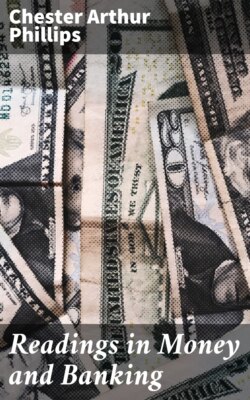Читать книгу Readings in Money and Banking - Chester Arthur Phillips - Страница 45
На сайте Литреса книга снята с продажи.
Оглавление| Year | Number | Liabilities |
| 1857 | 4,257 | $265,500,000 |
| 1858 | 3,113 | 73,600,000 |
| 1859 | 2,959 | 51,300,000 |
| 1860 | 2,733 | 61,700,000 |
| 1861 | 5,935 | $178,600,000 |
| 1862 | 1,652 | 23,000,000 |
| 1863 | 495 | 7,900,000 |
| 1864 | 510 | 8,600,000 |
| 1865 | 500 | 17,600,000 |
The very great decrease both in the number and the liabilities of firms that failed is the best proof that almost all business enterprises were "making money."
From one point of view the small number of failures is surprising. An unstable currency is generally held to make business unsafe, and seldom has the standard money of a mercantile community proven so unstable, undergone such violent fluctuations in so short a time, as in the United States during the Civil War. Yet, instead of being extremely hazardous, business seems from the statistics of failures to have been more than usually safe.
The explanation of the anomaly seems to be that the very extremity of the danger proved a safeguard. Business men realized that the inflation of prices was due to the depreciation of the currency, and that when the war was over gold would fall and prices follow. They realized very clearly the necessity of taking precautions against being caught in a position where a sudden decline of prices would ruin them. They did this by curtailing credits. So long as prices continued to rise such precautions were really not needed by the man in active business except, in so far as he was a creditor of other men; but when prices commenced to fall prudence had its reward. Such a sudden and violent drop of prices as occurred between January and July, 1865, would have brought a financial revulsion of a most serious character upon a business community under ordinary circumstances. But so well had the change been prepared for, that the number of failures was actually less than it had been in the preceding year of rapidly rising prices.
The whole situation can hardly be explained better than it was by a New York business man writing in Harper's Monthl Magazine: "When the war ended," he said, "we all knew we should have a panic. Some of us, like Mr. Hoar, expected that greenbacks and volunteers would be disbanded together. Others expected gold to fall to 101 or 102 in a few days. Others saw a collapse of manufacturing industry, owing to the cessation of Government purchases. But we all knew a 'crisis' was coming, and having set our houses in order accordingly, the 'crisis' of course never came."
